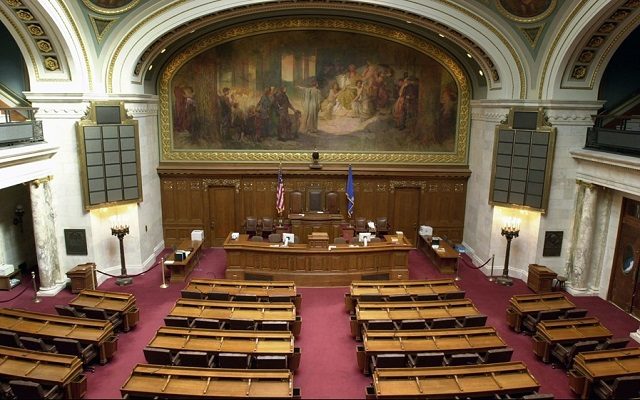Republican leaders say no more money for University of Wisconsin or school safety office

By SCOTT BAUER Associated Press
MADISON, Wis. (AP) — Republicans plan to make no substantive changes to the state budget, meaning that a cut in funding to the University of Wisconsin System that puts the entire spending plan in jeopardy of being vetoed will remain, legislative leaders said Tuesday.
Democratic Gov. Tony Evers has threatened to veto the two-year spending plan if UW funding for diversity, equity and inclusion, or DEI, programming is cut. The plan passed by a Republican-controlled budget committee reduces UW funding by $32 million and eliminates nearly 190 positions, money and staff dedicated toward DEI staff salaries and programs.
However, the budget does allow UW to come back and get the $32 million if it shows how it would be spent on workforce development efforts, and not DEI programs.
Evers also has the power to make more limited line-item vetoes, but he could not increase funding with a partial veto. Evers on Sunday told WISN-TV that he was waiting to see the final budget text before making decisions on vetoes. His spokesperson Britt Cudaback referred to those comments Tuesday when asked about the governor’s plans.
Assembly Speaker Robin Vos said he “can’t imagine” that Evers would veto the entire budget because of the UW funding cut. But Vos says he had not spoken with Evers about it.
The Senate is scheduled to vote on passing the budget on Wednesday. It would then go to the Assembly, which would have to pass an identical version before it would go to Evers. The Assembly could make changes, which would then send it back to the Senate for another vote.
But Senate Majority Leader Devin LeMahieu and Vos told The Associated Press in separate interviews Tuesday that no changes were planned.
Democratic Attorney General Josh Kaul, along with school and law enforcement leaders, have been pushing Republicans to increase funding for the state’s school safety office. That office, created by Republicans in 2018, was designed to prevent violence in schools after the mass shooting at Marjory Stoneman Douglas High School in Parkland, Florida.
The office provides safety grants to Wisconsin schools, maintains a 24/7 tip hotline, offers training and maintains blueprints of school layouts to assist law enforcement when reacting to emergencies. The Legislature’s budget committee voted to cut funding for the office this month, a move that Kaul said would essentially gut it and not allow it to provide all the services it currently does.
The office would have more than half a million dollars in funding to pay for nearly four full-time positions. It currently employs 16 people, with 12 of them paid for by time-limited federal funding that came during the pandemic.
Vos defended the cut, saying the Legislature won’t replace pandemic-era federal funding and that the core functions of the office can continue with the money provided.
If Kaul wants to make a case to the Legislature later for additional funding, “we’re always willing to take a look at it,” Vos said.
Kaul said he was “certainly disappointed” that the Legislature doesn’t plan to continue current funding levels. If funding isn’t found to replace it by the end of the year, Kaul said programming that helps schools around the state may be lost.
Kaul said that all avenues to maintain current funding, including going back to the Legislature, will be pursued.
Democrats and child care providers have also been pushing to restore funding for a pandemic-era child care subsidy program that Republicans cut. Advocates have argued that the move would be devastating for needy families and the state’s economy.
Kaul, the UW System and others advocating for additional funding have argued that it could be done given that the state has a projected budget surplus of nearly $7 billion. Republicans have instead focused on cutting taxes.
The state budget includes a $3.5 billion income tax cut for all taxpayers, a plan Democrats have derided because wealthy people will get a bigger reduction than lower earners. The budget also includes $1 billion more for K-12 public schools, additional funding that Evers secured as part of a deal with Republicans to increase state aid to Milwaukee and other local communities.
Evers signed the past two state budgets passed by Republicans and took credit for tax cuts they included.






